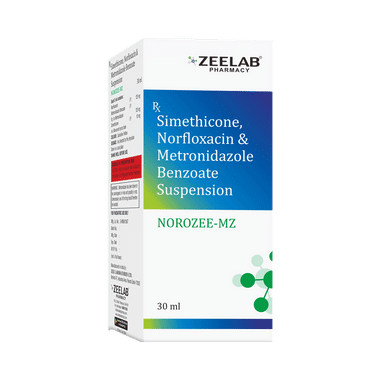All Details About Norozee-MZ Oral Suspension
Find out detailed description, uses, directions of use, side effects, warnings and precautions, frequently asked questions about Norozee-MZ Oral Suspension
Description:
Norozee-MZ Oral Suspension is an antibiotic medicine that effectively treats a wide range of bacterial and parasitic infections. In children, it is used to treat infections of the teeth, lungs, gastrointestinal tract, urinary tract, and genital tract. It also disintegrates gas bubbles and allows easy passage of gas.Donate Norozee-MZ Oral Suspension to your child orally, preferably at a fixed time, either before or after food. In case your child develops a stomach upset, prefer giving it with food. The usually prescribed frequency is twice a day, once in the morning and once in the evening. If your child vomits within 30 minutes of intake, repeat the same dose but never double up the dose if it is time for the next dose. The dose and duration depend upon the type and severity of the infection, your child’s age, and body weight, so stick to the dose, time, and way prescribed by the doctor.
Some children may develop minor and temporary side effects after taking this medicine. These include nausea, vomiting, anorexia, metallic taste, headache, loss of appetite, abdominal cramps, and mild skin rash. These side effects usually go away once your child’s body adapts to the medicine. However, in case they persist for long or start bothering your child, you must consult your child’s doctor without any delay.
Your child’s doctor must be aware if your child has ever had any previous episode of allergy, heart problem, liver impairment, and kidney malfunction. This will guide the doctor in planning your child’s overall treatment.
Uses:
- Treatment of Bacterial & parasitic infections
Directions For Use:
Take this medicine in the dose and duration as advised by your doctor. Check the label for directions before use. Measure it with a measuring cup and take it by mouth. Shake well before use. Norozee-MZ Oral Suspension may be taken with or without food, but it is better to take it at a fixed time.Side Effects:
Most side effects do not require any medical attention and disappear as your body adjusts to the medicine. Consult your doctor if they persist or if you’re worried about themOrdinary side effects of Norozee-MZ
- Vomiting
- Nausea
- Weight loss
- Abdominal cramp
- Loss of appetite
- Headache
- Insomnia (difficulty in sleeping)
- Dizziness
- Metallic taste
- Skin rash
Warning & Precautions:
FAQs:
Q. My child has a genetic deficiency of the G-6-PD enzyme. Is it safe to give Norozee-MZ Oral Suspension?
Q. Can Norozee-MZ Oral Suspension be given along with cough and cold medicines?
Q. What if I give excess Norozee-MZ Oral Suspension by mistake?
Q. What should I do if my child shows no improvement even after taking Norozee-MZ Oral Suspension for the prescribed duration?
Q. What should I tell the doctor before giving Norozee-MZ Oral Suspension to my child?
Q. Can other medicines be given at the same time as Norozee-MZ Oral Suspension?
Q. Can I get my child vaccinated while on treatment with Norozee-MZ Oral Suspension?
Disclaimer:
Getomeds primary intention is to ensure that its consumers get information that is reviewed by experts, accurate, and trustworthy. The information and contents of this website are for informational purposes only. They are not intended to be a substitute for professional medical advice, diagnosis, or treatment. Please seek the advice of your doctor and discuss all of your concerns about any disease or medication. Do not disregard or postpone seeking professional medical advice because of something you read on Getomeds. Our mission is to support, not replace, the doctor-patient relationship.

